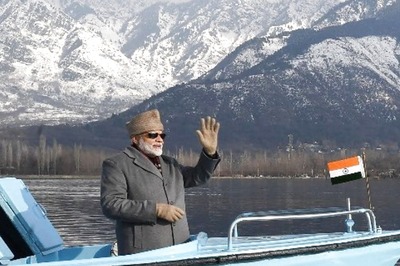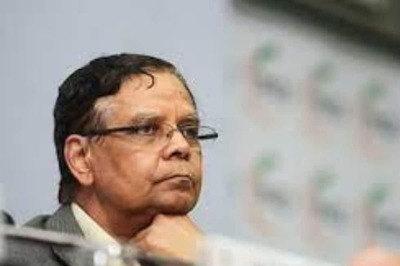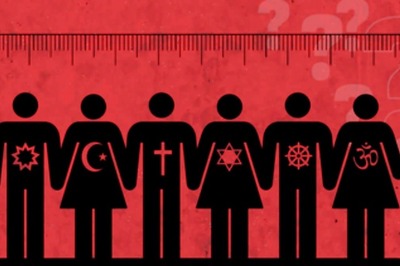
views
New Delhi: Just days after resigning as the vice-chairman of Delhi Dialogue and Development Commission, Ashish Khetan says he is open to working with Prashant Bhushan.
It is surprising as in 2015 the two had a public fallout when Prashant Bhushan blamed Khetan of writing stories in favour of 2G accused in Tehelka magazine where he used to work.
In a wide-ranging interview with CNN-News18's Rupashree Nanda, Khetan spoke about how he would like to collaborate with Prashant Bhushan and practise law.
Here are the edited exercpts from the innterview:
Q) You had given three years to the DDC and before that you had a 'Delhi dialogue ' series going on in the run up to 2015 elections. What is the real reason for quitting the post so suddenly?
Ashish Khetan: First of all, it is not a sudden decision. I wanted to quit for quite sometime, but because of one reason or the other, the resignation was put on hold. For the last one and one and half years, I was very keen to practise law and join the bar in Delhi. The Bar Council rules prohibit lawyers from holding any government and non-government employment. This is the only reason why I have quit DDC because I want to enroll at the bar.
Q) Why would you want to enroll at the bar when you are committed to doing something for the people of Delhi?
Ashish Khetan: I will tell you the backdrop in which Delhi Dialogue Commission was formed, later it was re-named as 'Dialogue and Development Commission of Delhi'. When it was instituted in the first place, it was set up to bridge the knowledge deficit and the capacity deficit in the government and also to take advantage of a vast pool of domain expertise which lies outside the government. We did that quite successfully when we set up a large number of task forces, professionals and experts came and they devoted their time and effort on a completely honorary basis. As a result we gave almost 75 to 80 detailed policy recommendations. Each policy recommendation supported by detailed documentation and research. But now I think it is time to move on. DDC is a think tank and a body of ideas and I personally believe that any such body required regular infusion of new energy and fresh talent. So I was also getting a bit jaded.
Q) Why do you say that? There was so much to be done considering the manifesto promises of AAP?
Ashish Khetan: As I said, DDC had a limited and specific mandate and as far as the fulfilment of manifesto promises is concerned, it will eventually be done by the department concerned. It will be done by the health department, the education department, transport department. So we had a specific job and role which is to bridge the knowledge in the government with the knowledge outside the government. And we did that very very successfully and now it is time that a new face and new people take over and carry the job forward.
Q) I have read somewhere that there was a sense of frustration about things not happening quickly. Is it true that you were frustrated about things not moving fast or there was a sense of being hemmed in by many factors, of not being able to achieve things quickly?
Ashish Khetan: I have said that there was a sense of frustration within the political executive of Delhi because of obvious reasons. Because for the past three years, for every step of the way, hurdles, unnecessary obstacles had been created and those obstacles were created by, you know, the powers that be. So there is an overall sense of frustration. We wanted to set up one thousand mohalla clinics. If things had gone smoothly, all of them would have been up and running by now. We wanted to roll out public wi-fi, we wanted to set up aam aadmi canteens on the lines of Amma canteens in Tamil Nadu. The work has been slow. There is an overall sense of frustration to that extent.
Q) Did that lead you to take this decision?
Ashish Khetan: Well, no. As I said, I believe that I did my job to the best of my ability. There is a lot more to be done. But I sincerely believe that now it is time that new people should come in and they should take the responsibility. Because three years is a lot of time. You put in your time and effort, first in creating an institution and then running that institution, then hiring people, managing task forces, studying different aspects of governance like water, sanitation, waste management, health, transport, education, sports. It was quite draining on my time and energy and I always wanted to practise law. So I believe that this was the time. If I don’t do it now, it may never happen.
Q) What do you think is your single biggest contribution as VC of DDC?
Ashish Khetan: Well, I would not like to blow my own trumpet. So I would rather let neutral observers, the Chief Minister and others to decide that what has been the contribution of DDC?
Q) There has also been speculation that you were supposed to be joining as political advisor to the Chief Minister and that appointment never came through. Had that gone through would you have liked to be the political adviser of Delhi CM?
Ashish Khetan: See, that appointment was done or was sought to be done in a very specific context. There was a particular time when there was no one to manage the affairs of the chief minister's office and as an interim measure, the chief minister could have availed the services of an experienced administrative hand. I was sought to be put as an adviser to the chief minister. But because of the various technicalities that could not happen. Though I did run the chief minister's office as an additional charge for a few weeks or a few months. And then the Chief Minister did find a retired IAS officer and he was put as an adviser.
Q) Would you have liked to do that?
Ashish Khetan: As I said it was only an interim stop-gap arrangement. There was never any intention either on the Chief Minister's part or my part to be a permanent adviser in chief minister's office.
Q) Lok Sabha elections are due in 2019. There is speculation that you want to be more active politically and are looking at fighting elections again. So, given a chance, would you contest Lok Sabha elections?
Ashish Khetan: Well , the decision to field candidates is a party decision and as and when the party takes a decision, then we will see.
Q) But you are open to contesting. You have contested earlier also.
Ashish Khetan: See, as of now, Lok Sabha elections are not on my mind.
Q) You are saying that, but Lok Sabha elections are not very far away.
Ashish Khetan: You are right. But as of now, it is not one of my top priorities.
Q) You have been a journalist. Then entered politics. Now you are going for law. What is the strongest calling in you?
Ashish Khetan: I think my strongest calling is to do public service and law. Political engagement and writing they go hand in hand. I have been fortunate that for the past 16-17 years I have been at the intersection of the three. So I will continue to be what I was. I will continue to write. In fact, I will continue to write a little more since I am not saddled with government responsibilities. Law is quite intrinsic to political and public life and I am looking forward to my new career and my stint in legal profession.
Q) How would you describe the leadership of Arvind Kejriwal? Because everytime somebody quits there is a perception that he is not able to handle people, their talents? Is that just a percetion? Everyone who leaves has harsh things to say about him.
Ashish Khetan: Arvind is a very dynamic, sincere and honest leader. I think what drives and motivates Arvind is public good. He has the national and the public good at the center of all his functioning. As far as people saying harsh things, well people have ambitions, political ambitions and when those ambitions are not satisfactorily met, people get disillusioned.
Q) So you would say that it is only ambition that has led people to drift away?
Ashish Khetan: I don’t want to comment on individual cases. There were, of course, a lot of other issues as well. One must understand that new people will always join and some people will always leave and though it is always very painful when colleagues leave, but such is life.
Q) You have been close to Prashant Bhushan also. Are you open to working with Prashant Bhushan?
Ashish Khetan: Of couse. I am open to working with Prashant ji. I have great regards for him and as and when there is any public cause or any legal case we can collaborate. I would certainly like to do that.
Q) This is important because there was a public fall out between Prashant Bhushan and you.
Ashish Khetan: I would describe that as temporary indiscretion and that lies in the past now.
Q) Do you see Prashant Bhushan and Arvind Kejriwal coming together?
Ashish Khetan: It will be good if they can work together.
Q) Do you think there is a possibility?
Ashish Khetan: Of course, life is all about possibilities.
Q) Have they spoken to each other?
Ashish Khetan: Well, I think you should speak to both of them.
Q) Will you reach out?
Ashish Khetan: To Prashant ji?
Q) And Arvind, for a coming together.
Ashish Khetan: Of course.
Q) Will you do that?
Ashish Khetan: Of course.
Q) Do you think the outcome of Punjab elections so dashed the hopes of the party that it changed it?
Ashish Khetan: Punjab was a huge disappointment for the party and the party leadership because we really believed at one point of time that just like Delhi, Punjab will also overwhelmingly support AAP and vote for us… I do not agree that the character of the party has changed in the wake of the Punjab defeat, I think the party still runs and adheres by its founding values and core principles.
Q) Are you shocked by the way Arvind Kejriwal has apologised to those he once offended?
Ashish Khetan: Well you have to appreciate that for any Chief Minister to face 38 cases in different courts on a day to day basis is almost an impossible task. There were two choices. One was to go from court to court, first day in Patiala Court, second day in Tees Hazari Court, third day a court in Amritsar and fourth day in Bombay and so on. Or, fulfil one's constitutional responsibilities towards the people of Delhi as the Chief Minister.
I think it was a tough choice, but I think right decision has been made. The CM now has more time on his hands to focus on the job in Delhi.
Q) But remember, it was the same Arvind Kejriwal who had challenged criminal defamation in SC? It was the same Arvind Kejriwal who had gone to jail because he refused to sign a bail bond. Has the tool of criminal defamation has been used effectively to silence someone like Kejriwal also?
Ashish Khetan: The law of criminal defamation is an archaic law. It should not exist on statute. It is extremely unfortunate that the Supreme Court in its wisdom upheld the constitutionality of this law because this law is only being used to silence dissent, to politically harass, intimidate your political adversaries, sometimes journalists, civil society activists. I really hope that sooner than later, the Supreme Court will review its judgment on criminal defamation.
Q) Do you think that AAP is becoming assimilated? Becoming more and more like any other party? In what way is the AAP different from any other political party? Remember the day it was formed and the promises it made?
Ashish Khetan: There are caste-based political parties, who represent a specific caste and hold their interest paramount to the interest of another community. That is caste politics. There are regional parties, which are entirely based on the politics of regional identity which is that they champion: regional interest above all other interests. There are communal parties, which espouse the interest on one community over the interest of other communities and rights of all other communities. If there is one party in the country which is not doing this kind of politics, it is AAP. What is our politics? That the country needs more schools, the country needs better schools, the country needs good education for its kids and the country needs good health care system for its citizens, the country does not need riots. The country does not need divisions on the basis of caste and community and regions. The country needs to move forward as a singular cohesive unit.
Q) Is AAP now a Delhi-centric party?
Ashish Khetan: AAP has a government in Delhi, but AAP is not a Delhi-centric party.
Q) Do you see AAP having the bandwidth to expand quickly, to make a difference in Lok Sabha elections, to make a difference say anywhere else except for Delhi and maybe a little bit in Haryana?
Ashish Khetan: AAP certainly does not have the bandwidth to expand, AAP did not have the means to form a government in Delhi first in 2013 and then in 2015. It is the people who helped bring about a change. People everywhere, whether in Delhi or in other states, they will marshal the resources and they will vote for AAP if the want to bring about a change.
Q) How do you see your journey with AAP? And where do you think you stand now?
Ashish Khetan: I think it is a very personal question. So I would give a very short answer to that. It has been a rollercoaster of a ride being in AAP. But my journey is not important. The journey of the party is very important. The journey of the thousands of voluntèers is important. There are the faceless, nameless dedicated foot solidiers, volunteers, the common man who have created this party and are still running it. They are the ones who will take this party forward.
Q) What will be your role?
Ashish Khetan: Well, whatever I can do for the party, I will continue to do for the party. Individual roles are not very important. For me, the nation comes first. There is no question of any rift between AAP and me. Being part of government and part of party are two different things. One does not necessarily have to be part of the government to be part of party.




















Comments
0 comment